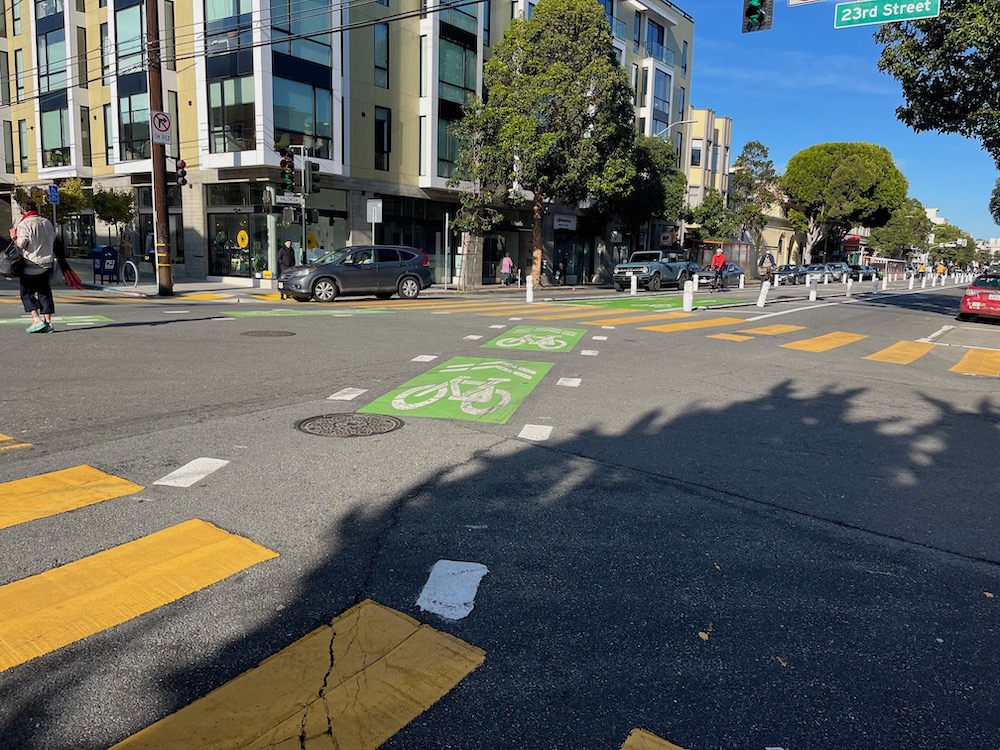In the heart of San Francisco’s Mission District, the once-vibrant Valencia Street has turned into a shadow of its former self. A recent addition to the neighborhood, the center-running bike lane, has wrought havoc upon cyclists, residents, and merchants, making the corridor unsafe and undesirable to visit.
However, the Valencia Bike Lane is not an isolated incident; it’s part of a troubling pattern of the San Francisco Municipal Transportation Agency blatantly disregarding community input, mandated legal processes, and neglecting the impact on small businesses and the environment.

Amado’s, an independent live entertainment venue that served the community for eight years, shut its doors in the last few weeks as a direct result of the bike lane’s implementation (the spaces that existed at this address prior provided music and arts events to the community for at least 60 years through different iterations). While Amado’s had suffered a flood a few months prior to the bike lane, the club was carried along by a massive wave of community support and sold-out shows, continuing on despite a drop in revenue.
When the Valencia Center-Running Bike Lane was installed, the ensuing colossal revenue drop proved to be impossible to survive, with closure becoming the only option.
Neighboring small businesses find themselves wrestling with the same dire situation and catastrophic losses to their revenues, making remaining open impossible. Already struggling to survive in the post pandemic economy, this bike lane project has forced them to the brink of closure. West of Pecos, SYSTEM, Mission Subs, BoBop, Laku, and Biriani House have closed in addition to Amado’s, just to name a few. But it’s not just about livelihoods; it’s about the culture and vitality that these businesses brought to the Mission District. The Valencia Center Running Bike Lane has become a death blow to arts and culture in the Mission, affecting the entire city as a result.
Even more disheartening is the overwhelming public opposition to this quick-build bike lane project, with the majority of public sentiment against this current iteration on Valencia. It is also imperative to understand that before the center bike lane was voted on, the SFMTA conducted their own survey as to its viability and popularity. 88 percent of respondents, many of whom were cyclists, were vehemently opposed to it.
The need for cyclists to turn from the middle lane for both right and left turns has created an incredibly hazardous situation. Environmentally, the removal of left turns has created a three-right-turns-to-make-a-left-scenario which keeps drivers in their cars longer.
Recent disasters like a fire across from Amado’s highlight how the center bike lane hampers emergency response efforts. First responders rushing to calls in the bike lane create another deadly situation for cyclists. Adding to the chaos, the persistent issue of double parking on the corridor has become worse, causing further traffic congestion and complicating an already problematic situation. All of this, plus the danger of the bike lane itself, where cyclists can collide with each other head on as seen below:
Transparency should be at the core of any public agency’s operations, and SFMTA’s consistent lack of transparency, before and during, different projects raises serious concerns. It’s worth noting that the Valencia center bike lane was initially billed as a “pilot program,” through the Quick Build program, meaning it could be reverted if the data showed it was not working.
SFMTA claims “the data is promising” but yet has failed to make it public as promised.
This lack of openness with public data raises questions about the efficacy of the pilot, about the haste with which it was implemented, and lack of traffic and planning studies for long-term effects.
Additionally, there is a misconception about sales tax revenue data failing to back claims of Valencia bike lane impacting businesses. The article mentioning this only took into account the first three weeks of the Center Running Bike Lane’s installation—it has been in place for 6 months to date.
There is no reason this project could not be ripped out tomorrow and reverted back to the historic first bike lane in San Francisco, while the SFMTA redesigns a new, safer plan.
Many similar transit and quickbuild projects implemented across the city paint a picture of a clear pattern of SFMTA making false promises of transparency, ignoring community input, and neglecting environmental and small-business impact. In all these instances, including Valencia Street, these changes were imposed upon the community, rather than addressing valid concerns of revenue reduction in a struggling, post Covid economy. Rather than work collaboratively, residents, business owners, and stakeholders were shut out. The SFMTA moved forward with their plans despite overwhelming opposition, furthering distrust of a city agency known to be culturally incompetent.
There are promising reforms on the horizon. San Franciscans are exploring the possibility of a ballot measure for charter reform. One proposal suggests a 4-3 SFMTA appointment split: four appointed by the mayor and three by the Board of Supervisors. Alternatively, there is a growing call to make the SFMTA Board members elected representatives, ensuring they are directly accountable to the voters. Both would radically shift the autonomy of SFMTA, and bring direct accountability back to our residents.
These are serious issues that demand our attention, and the call for change at the SFMTA has never been more urgent. It’s time for a change in approach, one that prioritizes the public safety of our cyclists and residents, the well-being of our neighborhoods, and the sustainability of our small businesses, for the people who call San Francisco home.
Kevin Ortiz is the Co-President of the San Francisco Latinx Democratic Club, Mission District native, and small business consultant. David Quinby is the owner of Amado’s, a Mission District resident and owner of multiple small businesses in San Francisco for the past 35 years.



